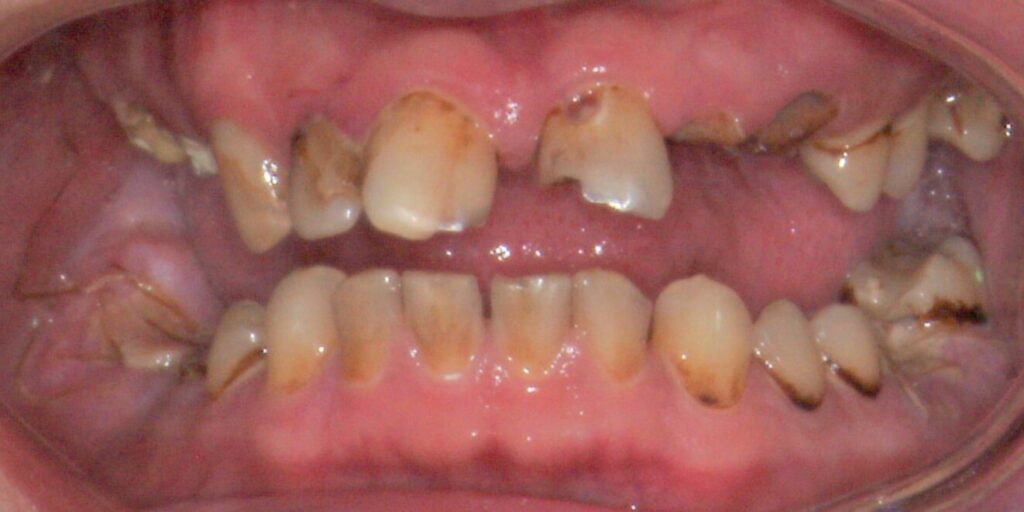Recovering from drugs and alcohol is an ongoing process. Having a healthy and attractive smile is an important aspect to one’s positive self-image and well-being during this process. The damage to your teeth caused by substance abuse is a constant reminder of the past and is demoralizing to the recovery process.
The Role of Dentistry in Recovery
With a healthy and attractive new smile, patients can experience an outwardly apparent physical recovery which is encouraging to the recovery effort. While this is only one aspect of the recovery, a healthy and attractive smile has proven to be vital in one’s emotional well-being and self-confidence. People who are confident in their smile are happier and more likely to stay on the path to recovery.
Our team has experience in treating both the dental damage as well as the person behind the substance abuse. A thorough understanding of the psychological aspects of substance abuse is critical to helping and treating patients who have suffered from substance abuse. We understand the fears and misconceptions that substance abuse patients experience related to their oral health and damaged teeth.
In this blog post we will briefly explain common oral health complications that arise from substance abuse, address common concerns that patients have in recovery, and what options are available for restoring smiles.
Drug Abuse Causes Damage to Teeth
Contrary to popular belief, many harmful drugs such as methamphetamine and cocaine do not themselves cause the most damage to teeth. Although some of these drugs contain battery acid, lye, or other harmful chemicals and additives that destroy teeth, it is typically the behaviors that come with using drugs such as bruxism (grinding and clenching teeth), consumption of sugary beverages, and neglect of oral hygiene that damages teeth most (Hazelden 2007). Many of these drugs also dehydrate patients, causing xerostomia- a dry mouth condition that throws off the pH balance of the mouth (Journal of American Dental Association 2005). Saliva is the mouth’s best line of defense, balancing the mouth’s pH and preventing tooth decay and bacteria.
Drug Abuse Patients can Trust their Dentist
Many patients suffering from substance abuse are scared to see their dentists or disclose information about their substance abuse for a variety of reasons including:
- Fear of being judged by their dentist
- Fear of being reported to authorities for using illegal drugs
- Fear of realizing the damage done to their teeth
Every patient should feel comfortable telling their dentist or hygienist about any previous or current substance abuse history. The dentist is not there to report or judge you, but rather to care for you as well as possible, getting your oral health back on track.
The more you disclose to your dentist, the more they can help you.
Disclosing everything about substance abuse history will also minimize a recovering patient’s chances of relapsing because the dentist will be aware and sensitive to their unique situation. By knowing their past, the dentist can help them seek alternative non-habit forming anesthetics and pain medication.
Dental Rehabilitation
The good news is, no matter what stage of recovery you are in or how bad the damage is, there is hope for restoring your smile! The treatments and procedure used to restore damaged teeth depends on how long oral health has been ignored and the severity of the damage. A full-mouth dental rehabilitation is necessary in the most severe cases. Here are some treatments that are commonly seen for treating teeth damaged by substance abuse:
- Inlays/Onlays
- Veneers
- Crowns
- Bridges
- Dental Implants
- Dentures
Conclusion About Addiction,Drug Abuse, and Dental Rehabilitation
The most important thing to remember is that having an addiction or problem with substance abuse shouldn’t make you scared to see your dentist. Dentists and hygienists take privacy very seriously and are sensitive to the discrete nature of recovery. They consider themselves partners in recovery and are serious about successful rehabilitation from addiction and substance abuse. It is important to feel good about your effort and be confident in the progress you are making. Don’t delay seeing your dentist during your recovery!
- “Methamphetamine Use and Oral Health”, 2005; Journal of American Dental Association Vol. 136
- “Meth & Oral Health: A Guide for Dental Professionals”, 2007; Hazelden Foundation


Teeth Restoration: What is it?
Amazing blog, thanks for sharing the useful information and the article is nice to share everyone.
Very nice information. keep sharing always. Its very useful for us.
for teeth protection what do we do? mouth invironment is alkalin or acidic?
Healthy mouth is slightly alkaline. For teeth protection, you brush, floss and avoid sugary and acid foods, drinks, snacks.
I think this is one of the most vital info for me. And i’m glad reading your article. But should remark on few general things, The site style is great, the articles is really nice : D. Good job, cheers|
Can meth use damage you teeth implants?
Yes, meth use can damage the bone and tissue around implants causing implant failure. With methamphetamine use, the saliva decreases which can cause more bacteria to build up around the implant which will make the bone and tissue recede over time. Also, in most meth users, oral hygiene decreases causing even more plaque build up. Thanks for your question! -Dr. Kyle Stanley